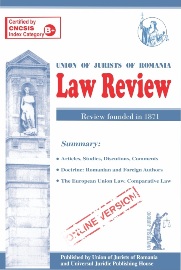IS THE PLEA AGREEMENT PRACTICE OF THE INTERNATIONAL CRIMINAL TRIBUNALS A PATHWAY TO NEGOTIATED JUSTICE WITHIN NATIONAL JURISDICTIONS?
IS THE PLEA AGREEMENT PRACTICE OF THE INTERNATIONAL CRIMINAL TRIBUNALS A PATHWAY TO NEGOTIATED JUSTICE WITHIN NATIONAL JURISDICTIONS?
Author(s): Liviu-Alexandru LascuSubject(s): Law, Constitution, Jurisprudence, Criminal Law, Civil Law, International Law
Published by: Universul Juridic
Keywords: plea agreement; plea bargaining; guilty plea; negotiated justice; ad-hoc tribunals; adversarial; inquisitorial; common law; civil law;
Summary/Abstract: Having already a long career in the Anglo-American judicial systems, the Plea Agreement is a pioneering procedure in the civil law countries. In the latest decades it became more and more attractive to the European continental countries due to the fact it makes possible a significant workload’s decongestion of the criminal law enforcement bodies as well as an easier prosecution in the other criminal files. However, there is a still remaining reluctance of the European continental legislators to employ this procedure to a wide scale of crimes and to allow negotiated justice with the perpetrators of the most severe crimes. The opponents of this concept consider this procedure as very difficult to reconcile with the traditional principles and procedural institutions of the civil law countries. Within the context of the first steps of Plea Agreement in the most European continental countries we observe an already existent and consistent jurisprudence in this respect in the proceedings of the international ad-hoc tribunals, ICTY (international Criminal Tribunal for former Yugoslavia) and ICTR (International Criminal Tribunal for Rwanda). The expertise of the judicial bodies of these tribunals might be a valuable model of doing negotiated justice within the European continental countries at least because the patterns of their Plea Agreement are very similar. The aim of this article is to emphasize the main features of the Plea Agreement procedure in the traditional systems, common law and civil law, as well as the features of this concept as it has been implemented into the proceedings of the ad-hoc tribunals and, accordingly, to analyze the reasons for which, the expertise of these international tribunals might be a pathway to negotiated justice to the national level of the civil law countries.
Journal: Law Review
- Issue Year: 2013
- Issue No: 02
- Page Range: 63-89
- Page Count: 27
- Language: English
- Content File-PDF

